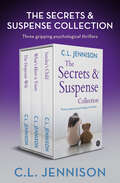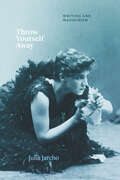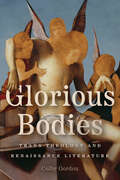- Table View
- List View
The Secrets & Suspense Collection: The Desperate Wife, What's Mine is Yours, and Sunday's Child
by C. L. JennisonThree gripping psychological thrillers in one volume about the dark things that go on behind closed doors . . . This compelling collection of full-length novels by rising star C. L. Jennison includes:The Desperate Wife Trapped in her marriage to Rex, a violent and controlling man, Ava has one bright spot in her life: her online tutoring sessions with Ali. Their lessons soon lead to an affair that promises a respite from her vicious marriage. But escape attempts can be dangerous . . .What&’s Mine Is Yours Polly has just begun working as a nanny for the Lawrensons at their new home in the Yorkshire countryside. But then the insecure Mrs. Lawrenson starts oversharing—and soon, Polly is caught in the crossfire when a seemingly happy marriage explodes . . .Sunday&’s Child Thirteen-year-old Kaleb has gone missing—and Laney Atkinson and her sister are keeping a secret: their kids were the last to see Kaleb alive . . .
Throw Yourself Away: Writing and Masochism (Thinking Literature)
by Julia JarchoProposes that we can best understand literature’s relationship to sex through a renewed focus on masochism. In a series of readings that engage American and European works of fiction, drama, and theory from the late nineteenth through the early twenty-first centuries, critic and playwright Julia Jarcho argues that these works conceive writing itself as masochistic, and masochism as sexuality enacted in writing. Throw Yourself Away is distinctive in its sustained focus on masochism as an engine of literary production across multiple authors and genres. In particular, Jarcho shows that theater has played a central role in modern erotic fantasies of the literary. Jarcho foregrounds writing as a project of distressed subjects: When masochistic writing is examined as a strategy of response to injurious social systems, it yields a surprisingly feminized—and less uniformly white—image of both masochism and authorship. Ultimately, Jarcho argues that a retheorized concept of masochism helps us understand literature itself as a sex act and shows us how writing can tend to our burdened, desirous bodies. With startling insights into such writers as Henry James, Henrik Ibsen, Mary Gaitskill, and Adrienne Kennedy, Throw Yourself Away furnishes a new masochistic theory of literature itself.
Glorious Bodies: Trans Theology and Renaissance Literature
by Colby GordonA prehistory of transness that recovers early modern theological resources for trans lifeworlds. In this striking contribution to trans history, Colby Gordon challenges the prevailing assumption that trans life is a byproduct of recent medical innovation by locating a cultural imaginary of transition in the religious writing of the English Renaissance. Marking a major intervention in early modern gender studies, Glorious Bodies insists that transition happened, both socially and surgically, hundreds of years before the nineteenth-century advent of sexology. Pairing literary texts by Shakespeare, Webster, Donne, and Milton with a broad range of primary sources, Gordon examines the religious tropes available to early modern subjects for imagining how gender could change. From George Herbert’s invaginated Jesus and Milton’s gestational Adam to the ungendered “glorious body” of the resurrection, early modern theology offers a rich conceptual reservoir of trans imagery. In uncovering early modern trans theology, Glorious Bodies mounts a critique of the broad consensus that secularism is a necessary precondition for trans life, while also combating contemporary transphobia and the right-wing Christian culture war seeking to criminalize transition. Developing a rehabilitative account of theology’s value for positing trans lifeworlds, this book leverages premodern religion to imagine a postsecular transness in the present.


